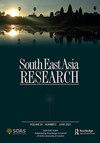“利国利家”:Bắc Hưng Hải灌溉系统与1954年后越南北部的实用主义集体主义
IF 0.9
3区 社会学
0 ASIAN STUDIES
引用次数: 0
摘要
摘要聚焦B的构建ắc Hưng Hải灌溉系统ại thủy nông Bắc Hưng Hải) 在20世纪50年代末社会主义的越南北部,本文考察了越南民主共和国政府在1954年后时期寻求建设社会主义的治国方略。为了动员当地工人(dân công)的自由劳动来建造大规模的灌溉系统,DRV的关键战略是鼓励工人接受我所说的“务实集体主义”的道德价值观。在关于B的官方叙述中ắc Hưng Hải、 当地工人的劳动服务不仅体现了他们对集体利益的自愿贡献,即对他人、国家和社会主义的利益,而且体现了他们对于自己、家庭和村庄的直接利益的正义追求。虽然这种国家认可的集体主义道德与其他社会主义背景下,特别是苏联和中国广泛支持的集体主义普遍价值观有着显著的相似性,但它也包含了与苏联式集体主义形成鲜明对比的元素,尤其是将追求个人和家庭利益视为与,而不是与追求集体利益相冲突。本文章由计算机程序翻译,如有差异,请以英文原文为准。
‘Good for the country, beneficial to the family’: the Bắc Hưng Hải irrigation system and pragmatic collectivism in post-1954 northern Vietnam
ABSTRACT Focusing on the construction of the Bắc Hưng Hải irrigation system (Đại thủy nông Bắc Hưng Hải) in socialist northern Vietnam in the late 1950s, this article examines the statecraft of the government of the Democratic Republic of Vietnam (DRV) as it sought to build socialism in the post-1954 period. To mobilize the free labour of local workers (dân công) to construct the massive irrigation system, the DRV's key strategy was to encourage workers to embrace a moral value that I term ‘pragmatic collectivism’. In official narratives about Bắc Hưng Hải, the labour service of local workers embodied not only their voluntary contribution to collective interests, i.e. the benefits of others, the country and socialism, but also their righteous pursuit of the immediate benefits of themselves, their families and villages. While this state-sanctioned version of collectivist morality shared remarkable similarity with the universal value of collectivism widely upheld in other socialist contexts, particularly the Soviet Union and China, it also incorporated elements much in contrast with Soviet-style collectivism, notably the treatment of the pursuit of individual and family benefits as in harmony with, rather than in conflict with, the pursuit of collective interest.
求助全文
通过发布文献求助,成功后即可免费获取论文全文。
去求助
来源期刊

South East Asia Research
ASIAN STUDIES-
CiteScore
1.90
自引率
0.00%
发文量
42
期刊介绍:
Published three times per year by IP Publishing on behalf of SOAS (increasing to quarterly in 2010), South East Asia Research includes papers on all aspects of South East Asia within the disciplines of archaeology, art history, economics, geography, history, language and literature, law, music, political science, social anthropology and religious studies. Papers are based on original research or field work.
 求助内容:
求助内容: 应助结果提醒方式:
应助结果提醒方式:


